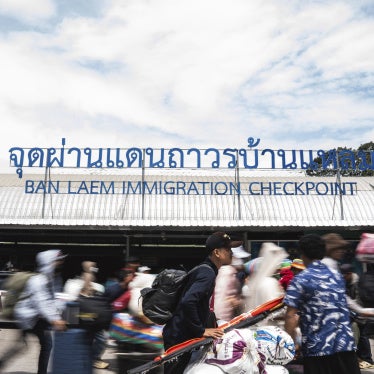As the Sri Lankan army and the Liberation Tigers of Tamil Eelam (LTTE) continue to battle on the outskirts of Jaffna town, Human Rights Watch today expressed grave concern about the safety of some five hundred thousand civilians on the Jaffna peninsula, and their urgent need for humanitarian assistance.
While both parties have issued appeals for civilians to move out of possible target areas, Human Rights Watch urged all parties to ensure the free movement of civilians away from combat areas, and stressed the urgent need to be prepared with emergency relief for those newly displaced by the fighting, including ready access to food, shelter, and medical assistance.
"This growing crisis demands immediate action, by both the Sri Lankan government and the LTTE," said Mike Jendrzejczyk, Washington Director of Human Right Watch's Asia Division. "The human rights of civilians caught in this conflict must be protected."
Human Rights Watch urged Sri Lanka's chief aid donors -- including Japan, the European Union, Canada, and the U.S. -- to call on the Ministry of Defense and other relevant government agencies to redouble efforts to ensure that humanitarian organizations are allowed to deliver essential food and medical relief to rebel-controlled areas.
UNHCR has received reports that the government of India might not allow refugees fleeing the conflict to enter the country. Human Rights Watch urged the Indian government to honor the international legal obligation not to return refugees to a country where their life or freedom would be threatened.
Previous bouts of heavy fighting in Sri Lanka's seventeen-year conflict have led to increased violence against civilians, particularly when significant territory has changed hands. This includes especially the hundreds of "disappearances" that took place after the army wrested control of Jaffna from the LTTE in late 1995.
In the northern and eastern parts of the country, the LTTE has tortured, killed, and "disappeared" people it accused of being informers, and has imposed severe restrictions on freedom of movement by attempting to prevent internally displaced persons from relocating out of LTTE-held territory. The LTTE's use of child soldiers has caused many displaced persons to flee from LTTE territory. LTTE forces are also believed to be responsible for the bombing of civilians in Colombo and elsewhere.
In areas controlled by the Sri Lankan security forces, meanwhile, Tamil civilians are the frequent targets of arbitrary arrests and lengthy detentions without trial, custodial abuse that includes torture, and extrajudicial killings.
On May 3, the government introduced new Emergency Regulations granting the police and armed forces sweeping powers of arrest and detention, restricting freedom of association, and censoring local and international media. After major gains by LTTE forces in the north, the government also banned all live television and radio programs and required government approval prior to transmission of all conflict-related news outside the country.
"The restrictions on journalists and on the activities and movement of humanitarian organizations have produced a virtual blackout of independent reporting on the situation and the lives that hang in the balance." said Jendrzejczyk.
The government should ensure that humanitarian agencies and NGOs are able to carry out independent assessments of ongoing humanitarian needs and monitor population displacement.
Human Rights Watch also urged the LTTE to allow relief agencies to function and impress on its forces the critically important and nonpartisan role played by these agencies.
Sri Lanka's displaced population, already estimated at 800,000 island-wide, has born the brunt of this lengthy conflict. Many are living in extreme poverty and have not led a settled existence more than a decade.








